第四次上机作业
task1_1
#include <stdio.h> #include<stdlib.h> #define N 4 int main() { int a[N] = {2, 0, 2, 3}; char b[N] = {'2', '0', '2', '3'}; int i; printf("sizeof(int) = %d\n", sizeof(int)); printf("sizeof(char) = %d\n", sizeof(char)); printf("\n"); for (i = 0; i < N; ++i) printf("%p: %d\n", &a[i], a[i]); printf("\n"); for (i = 0; i < N; ++i) printf("%p: %c\n", &b[i], b[i]); printf("\n"); printf("a = %p\n", a); printf("b = %p\n", b); system("pause"); return 0; }
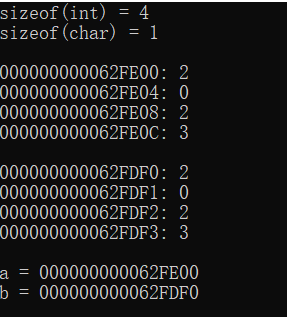
验证结果:
1.int 型数据在数组a是连续存放的,每个元素占4个内存字节单元
2.char型数据在数组b中是连续存放的,每个元素占1个内存字节单元
3.数组a对应的值和&a[0]一样,数组b对应的值和&b[0]一样
task1_2
#include <stdio.h> #include<stdlib.h> #define N 2 #define M 3 int main() { int a[N][M] = {{1, 2, 3}, {4, 5, 6}}; char b[N][M] = {{'1', '2', '3'}, {'4', '5', '6'}}; int i, j; for (i = 0; i < N; ++i) for (j = 0; j < M; ++j) printf("%p: %d\n", &a[i][j], a[i][j]); printf("\n"); printf("a = %p\n", a); printf("a[0] = %p\n", a[0]); printf("a[1] = %p\n", a[1]); printf("\n"); for (i = 0; i < N; ++i) for (j = 0; j < M; ++j) printf("%p: %c\n", &b[i][j], b[i][j]); printf("\n"); printf("b = %p\n", b); printf("b[0] = %p\n", b[0]); printf("b[1] = %p\n", b[1]); printf("\n"); system("pause"); return 0; }
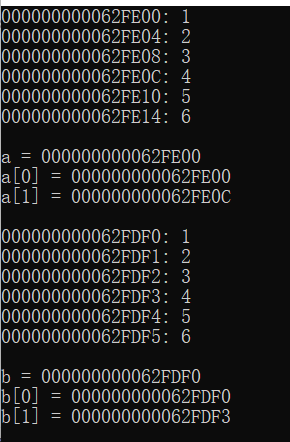
验证结果:
1.int 型二维数组a,在内存中是按行连续存放的,每个元素占4个字节
2.int 型二维数组a,数组名a和&a[0][0]的值,在数字字面上是一样的
3.char 型二维数组b,在内存中是按行连续存放的,每个元素占1个字节
4.char 型二维数组b,数组名b和&b[0][0]的值,在数字字面是是有一点
5.二维数组a[0]与a[1],b[0]和b[1]都是指的该行第一个元素地址
task2
#include <stdio.h> #include<stdlib.h> #include <string.h> #define N 80 void swap_str(char s1[N], char s2[N]); void test1(); void test2(); int main() { printf("测试1: 用两个一维维数组,实现两个字符串交换\n"); test1(); printf("\n测试: 用二维数组,实现两个字符串交换\n"); test2(); system("pause"); return 0; } void test1() { char views1[N] = "hey, C, I hate u."; char views2[N] = "hey, C, I love u."; printf("交换前: \n"); puts(views1); puts(views2); swap_str(views1, views2); printf("交换后: \n"); puts(views1); puts(views2); } void test2() { char views[2][N] = {"hey, C, I hate u.", "hey, C, I love u."}; printf("交换前: \n"); puts(views[0]); puts(views[1]); swap_str(views[0], views[1]); printf("交换后: \n"); puts(views[0]); puts(views[1]); } void swap_str(char s1[N], char s2[N]) { char tmp[N]; strcpy(tmp, s1); strcpy(s1, s2); strcpy(s2, tmp); }
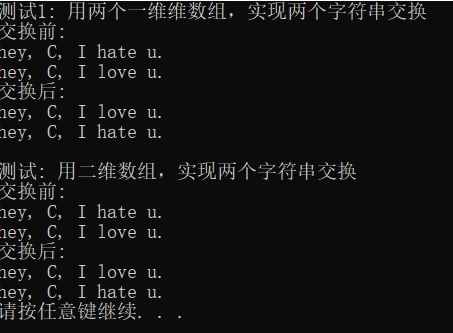
思考:如果数组是一维数组调用时可以不加[ ] 而数组如果是二维数组则调用的时候需要加[ ]
task3_1
#include<stdlib.h> #include <stdio.h> #define N 80 int count(char x[]); int main() { char words[N+1]; int n; while(gets(words) != NULL) { n = count(words); printf("单词数: %d\n\n", n); } system("pause"); return 0; } int count(char x[]) { int i; int word_flag = 0; int number = 0; for(i = 0; x[i] != '\0'; i++) { if(x[i] == ' ') word_flag = 0; else if(word_flag == 0) { word_flag = 1; number++; } } return number; }

task3_2
#include <stdio.h> #include<stdlib.h> #define N 1000 int main() { char line[N]; int word_len; int max_len; int end; int i; while(gets(line) != NULL) { word_len = 0; max_len = 0; end = 0; i = 0; while(1) { while(line[i] == ' ') { word_len = 0; i++; } while(line[i] != '\0' && line[i] != ' ') { word_len++; i++; } if(max_len < word_len) { max_len = word_len; end = i; } if(line[i] == '\0') break; } printf("最长单词: "); for(i = end - max_len; i < end; ++i) printf("%c", line[i]); printf("\n\n"); } system("pause"); return 0; }

1.在C语言里,char类型的变量存储的是ASCII码,而在askII码中a~z以及A~Z之间是连续的,所以可以用!(line[i] <= 'z '&&line[i]>='a' ||line[i] <= 'z '&&line[i]>='a')替换原先只判断是否为空格
2.统计最长单词数可以定义一个int型的数组将每一个单词的长度存入其中,可以用b[i]数组存储单词长度,然后使用a[b[i++]]=a[b[i++]]+1 (边界条件利用单词的个数),因为max_len记录了单词的最大长度,所以最后的a[max_len]就存储了最长单词的个数
task4
#include <stdio.h> #include<stdlib.h> #define N 5 void input(int x[], int n); void output(int x[], int n); double average(int x[], int n); void bubble_sort(int x[], int n); int main() { int scores[N]; double ave; printf("录入%d个分数:\n", N); input(scores, N); printf("\n输出课程分数: \n"); output(scores, N); printf("\n课程分数处理: 计算均分、排序...\n"); ave = average(scores, N); bubble_sort(scores, N); printf("\n输出课程均分: %.2f\n", ave); printf("\n输出课程分数(高->低):\n"); output(scores, N); system("pause"); return 0; } void input(int x[], int n) { int i; for(i = 0; i < n; ++i) scanf("%d", &x[i]); } void output(int x[], int n) { int i; for(i = 0; i < n; ++i) printf("%d ", x[i]); printf("\n"); } double average(int x[], int n) { int i; double ave = 0.0; for (i=0;i<n;i++) { ave+= x[i]; } return ave/n; } void bubble_sort(int x[], int n) { int i,j,t; for(i=0;i<n-1;i++){ for(j=0;j<n-1-i;j++) if(x[j+1]>x[j]){ t = x[j]; x[j] = x[j+1]; x[j+1] = t; } } }
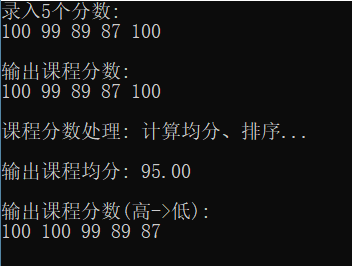
task5
#include <stdio.h> #include<stdlib.h> #include<string.h> #define N 100 void dec2n(int x, int n); int main() { int x; printf("输入一个十进制整数: "); while(scanf("%d", &x) != EOF) { dec2n(x, 2); printf("\n"); dec2n(x, 8); printf("\n"); dec2n(x, 16); printf("\n"); printf("\n输入一个十进制整数: "); } system("pause"); return 0; } void dec2n(int x, int n) { char s[]="0123456789ABCDEF"; char ans[100]; int i,r; for (i=0;x!=0;i++) { r = x%n; x = x/n; ans[i] = s[r]; } for(i;i>=0;i--) { printf("%c",ans[i]); } }

task6
#include <stdio.h> #include<stdlib.h> #define N 100 #define M 4 void output(int x[][N], int n); void rotate_to_right(int x[][N], int n); int main() { int t[][N] = {{21, 12, 13, 24}, {25, 16, 47, 38}, {29, 11, 32, 54}, {42, 21, 33, 10}}; printf("原始矩阵:\n"); output(t, M); rotate_to_right(t, M); printf("变换后矩阵:\n"); output(t, M); system("pasue"); return 0; } void output(int x[][N], int n) { int i, j; for (i = 0; i < n; ++i) { for (j = 0; j < n; ++j) printf("%4d", x[i][j]); printf("\n"); } } void rotate_to_right(int x[][N], int n) { int i,j,t; for (i = 0 ;i < n; i++){ t = x[i][n-1]; for (j = 0 ;j < n; j++) { x[i][n-1-j] = x[i][n-2-j]; } x[i][0] = t; } }
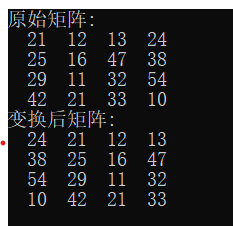
task7_1
#include <stdio.h> #include<stdlib.h> #define N 80 void replace(char x[], char old_char, char new_char); int main() { char text[N] = "The c programming Language is very difficlut for me,but i like it"; printf("原始文本: \n"); printf("%s\n", text); replace(text, 'i', '*'); printf("处理后文本: \n"); printf("%s\n", text); system("pause"); return 0; } void replace(char x[], char old_char, char new_char) { int i; for (i = 0; x[i] != '\0'; ++i) if (x[i] == old_char) x[i] = new_char; }

问题1:replace()实现的功能是将数组中之前的某一个字符换成一个指定的新字符。
问题2:'\0'在ASCLL字符中对应空字符NULL,是字符串的结束标识,因此可以做为line24行代码结束循环条件。
task7_2
#include <stdio.h> #include<stdlib.h> #define N 80 int main() { char str[N], ch; int i; printf("输入字符串: "); gets(str); printf("输入一个字符: "); ch = getchar(); printf("截断处理......"); i = 0; while (str[i] != '\0') { if (str[i] == ch) str[i] = '\0'; else i++; } str[i] = '\0'; printf("\n截断处理后字符串: %s\n", str); system("pause"); return 0; }

task8
#include <stdio.h> #include<stdlib.h> #include <string.h> #define N 5 #define M 20 void bubble_sort(char str[][M], int n); int main() { char name[][M] = {"Bob", "Bill", "Joseph", "Taylor", "George"}; int i; printf("输出初始名单:\n"); for (i = 0; i < N; i++) printf("%s\n", name[i]); printf("\n排序中...\n"); bubble_sort(name, N); printf("\n按字典序输出名单:\n"); for (i = 0; i < N; i++) printf("%s\n", name[i]); system("pause"); return 0; } void bubble_sort(char str[][M], int n) { int i,j; char t[20]; for(i=0;i<n-1;i++) for(j=0;j<n-i-1;j++) if(strcmp(str[j],str[j+1])>=0) { strcpy(t,str[j]); strcpy(str[j],str[j+1]); strcpy(str[j+1],t); } }
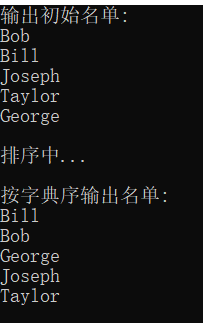




 浙公网安备 33010602011771号
浙公网安备 33010602011771号